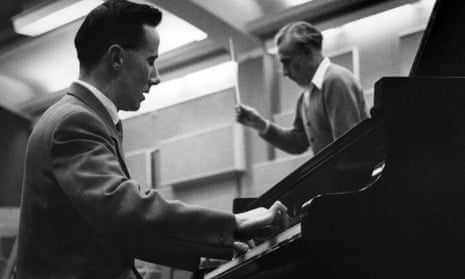An early Proms success with Rachmaninov’s Third Piano Concerto led Peter Katin, the British pianist who has died aged 84, to be identified more than he would have wished with that Romantic warhorse. His own musical tastes were formed, rather, around the classical repertoire, especially Mozart and Beethoven, as well as the music of Chopin, Schumann and Grieg.
In fact he auditioned for his first Prom in 1952 with Beethoven’s Fourth Piano Concerto, but was invited to play Tchaikovsky’s Second. The success of that led to a further engagement the following year, when, having happily agreed to play the second Beethoven concerto, he was asked instead to play Rachmaninov’s Third. That, too, proved a notable success, and for the following couple of decades he was associated primarily with the big display concertos, especially those of Rachmaninov and Tchaikovsky. In 1958 he became the first British pianist to make a solo tour of the USSR and he was also a well-known figure on the British and American concert scenes, appearing at the Proms 25 times between 1952 and 1974.
Beginning to tire somewhat of the superficial glamour attendant on performances of the warhorse repertoire, he started, in the mid-1970s, to focus more on the kind of music that spoke to him. The works of Chopin then began to provide the backbone of his repertoire and he made many recordings of them, including one of early and late compositions played on his own Collard & Collard square piano of circa 1836. The complete nocturnes, waltzes, polonaises, impromptus and scherzos were all recorded, alongside the complete Mozart sonatas, Rachmaninov preludes, Grieg’s Lyric Pieces and a range of other music including Scarlatti, Schubert, Schumann, Liszt and Debussy.
One disc was devoted to the music of Rosemary Brown, supposedly dictated to her by Chopin, Liszt and others from beyond the grave. Everything he played, whether Mozart sonatas or Rachmaninov preludes, was illuminated by finely calibrated tonal colouring and melting turns of phrase. His Liszt Consolations (1967) were deeply introspective, as though compensating for the bravura display of the warhorse years. But it was to Chopin that he brought the most acute poetic sensibility, conveying melancholy through a subdued, velvety tone.
Career-wise, however, his star was no longer in the ascendant. The major orchestras and record companies began to neglect him, as did the Proms. He emigrated in 1978 to Canada, where he taught at the University of Western Ontario. His wife, Eva Zweig, whom he had married in 1954, followed him out two years later but they decided to separate, finally divorcing in 1988. Katin meanwhile had returned to Britain, in 1984, to find himself not only forgotten by the musical establishment but also alienated by the more lurid marketing techniques then coming into vogue. “I picked up a copy of the Gramophone and found naked ladies draped over the cellos,” he told one interviewer. He began to promote himself, to play to music clubs, to teach more extensively (at the Royal College of Music, London, from 1992) and to record for smaller labels, where he had more control over artistic decisions. In 1997 he formed his own piano trio to explore repertoire for that combination and gave his official farewell recital at the Wigmore Hall (though it was not his final public appearance) in 2004, on which occasion flashes of musical inspiration were glimpsed in spite of his waning technical powers.
He was born in London, the son of a self-employed brass engraver ostracised by his Orthodox Jewish family for marrying a Christian woman. Partly because of the war, he received a minimal school education, leaving at the age of 14. He had been accepted by the senior department of the Royal Academy of Music, however, two years earlier and became head chorister of Westminster Abbey choir in 1943.
He made his Wigmore Hall debut in 1948, accompanied the violinist Alfredo Campoli in the 50s and gave three recitals with Victoria de los Angeles in the 1970s. As a supporter of the Campaign for Homosexual Equality he had the distinction of a concert in support of the campaign in 1974 being banned by the local council of Tunbridge Wells.
He is survived by his sons, Nicholas and Andrew.

Comments (…)
Sign in or create your Guardian account to join the discussion